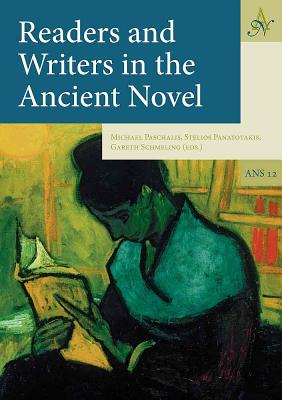
Readers and Writers in the Ancient Novel
Hardcover
Series: Ancient Narrative Supplements, Book 12
Literary CriticismAncient History General
Currently unavailable to order
Please enter your email and a message will be sent to you when this product becomes available on our website.
ISBN13: 9789077922545
Publisher: Barkhuis
Published: Dec 31 2009
Pages: 286
Language: English
Also in
Ancient History General
The Mesopotamian Riddle: An Archaeologist, a Soldier, a Clergyman, and the Race to Decipher the World's Oldest Writing
Hammer, Joshua
Hardcover
...and Forgive Them Their Debts: Lending, Foreclosure and Redemption from Bronze Age Finance to the Jubilee Year
Hudson, Michael
Hardcover
Story of the World, Vol. 1: History for the Classical Child: Ancient Times
Bauer, Susan Wise
Paperback
Impossible Monsters: Dinosaurs, Darwin, and the Battle Between Science and Religion
Taylor, Michael
Hardcover
A Brief History of Japan: Samurai, Shogun and Zen: The Extraordinary Story of the Land of the Rising Sun
Clements, Jonathan
Paperback
The Political and Strategic History of the World, Vol I: From Antiquity to the Caesars, 14 A.D.
Black, Conrad
Hardcover
The History of the Ancient World: From the Earliest Accounts to the Fall of Rome
Bauer, Susan Wise
Hardcover
Magicians of the Gods: Updated and Expanded Edition - Sequel to the International Bestseller Fingerprints of the Gods
Hancock, Graham
Paperback
Foundations of Chinese Civilization: The Yellow Emperor to the Han Dynasty (2697 BCE - 220 CE)
Liu, Jing
Paperback
The Horse, the Wheel, and Language: How Bronze-Age Riders from the Eurasian Steppes Shaped the Modern World
Anthony, David W.
Paperback
Why We Need to Be Wild: One Woman's Quest for Ancient Human Answers to 21st Century Problems
Carew Kraft, Jessica
Paperback
The Political and Strategic History of the World, Vol I: From Antiquity to the Caesars, 14 A.D.
Black, Conrad
Paperback
The Scythian Empire: Central Eurasia and the Birth of the Classical Age from Persia to China
Beckwith, Christopher I.
Paperback
Big Dinosaur Coloring Book: Dinosaur Gifts for 3 Year Olds - Paperback Coloring to
Coloring Funny, Family
Paperback
The Stoicism Book of Quotes: Over 200 Inspirational Quotations from the Greatest Stoic Philosophers
Yasenka, Kortney
Benas, Nick
Hardcover
The Yugas: Keys to Understanding Our Hidden Past, Emerging Energy Age, and Enlightened Future
Steinmetz, David
Selby, Joseph
Paperback
The Poison King: The Life and Legend of Mithradates, Rome's Deadliest Enemy
Mayor, Adrienne
Paperback
The Shortest History of the Dinosaurs: The 230-Million-Year Story of Their Reign and Their World
Black, Riley
Paperback
Return of the Fallen Ones: Nephilim Histories, the Antediluvian World, Anunnaki Chronology and the Coming Cataclysm
Breshears, Jason M.
Paperback
Divergent Worlds: What the Ancient Mediterranean and Indian Ocean Can Tell Us about the Future of International Order
Acharya, Amitav
Pardesi, Manjeet S.
Hardcover
An Illustrated Guide to Samurai History and Culture: From the Age of Musashi to Contemporary Pop Culture
Blair, Gavin
Hardcover
The Library of Ancient Wisdom: Mesopotamia and the Making of the Modern World
Wisnom, Selena
Hardcover
Ancient China: An Illustrated Introduction to the History, People, Culture and Beyond
Li, Biyan
Zhang, Zhaoyang
Zou, Yi
Paperback
Mythology of Mesopotamia: Fascinating Insights, Myths, Stories & History From The World's Most Ancient Civilization. Sumerian, Akkadian, Babylonian, P
Brought Alive, History
Hardcover
The Ancient's Book of Magic: Containing Secret Records of the Procedure and Practice of the Ancient Masters and Adepts 1940
de Claremont, Lewis
Paperback
The First Fossil Hunters: Dinosaurs, Mammoths, and Myth in Greek and Roman Times
Mayor, Adrienne
Paperback
The Map of Knowledge: A Thousand-Year History of How Classical Ideas Were Lost and Found
Moller, Violet
Paperback
Jerusalem the Center of the Universe: Its Archaeology and History (1800-100 BCE)
Finkelstein, Israel
Paperback
Road to Valor: A True Story of WWII Italy, the Nazis, and the Cyclist Who Inspired a Nation
McConnon, Andres
McConnon, Aili
Paperback
Mesoamerican History: A Captivating Guide to Four Ancient Civilizations that Existed in Mexico - The Olmec, Zapotec, Maya and Aztec Civilization
History, Captivating
Hardcover
...and forgive them their debts: Lending, Foreclosure and Redemption From Bronze Age Finance to the Jubilee Year
Hudson, Michael
Paperback
The Lost World of the Flood: Mythology, Theology, and the Deluge Debate
Longman, Tremper
Walton, John H.
Paperback
Proclus' on the Hieratic Art According to the Greeks: Critical Edition with Translation and Commentary
Pachoumi, Eleni
Hardcover
Ancient Civilizations: A Captivating Guide to Mayan History, the Aztecs, and Inca Empire
History, Captivating
Hardcover
In Search of Ancient Ireland: The Origins of the Irish from Neolithic Times to the Coming of the English
Eaton, Leo
McCaffrey, Carmel
Paperback
The Maya Civilization: An Enthralling Overview of Maya History, Starting from the Olmecs' Domination of Ancient Mexico to the Arrival of Hern
History, Enthralling
Hardcover
Popol Vuh: The Sacred Book of the Ancient Quiche Maya
Goetz, Delia
Recinos, Adrien
Morley, Sylvanus G.
Paperback
The Undying Stars: The Truth That Unites the World's Ancient Wisdom and the Conspiracy to Keep It from You
Mathisen, David Warner
Paperback
Norse Mythology: Captivating Stories & Timeless Tales Of Norse Folklore. The Myths, Sagas & Legends of The Gods, Immortals, Magical Cre
Brought Alive, History
Hardcover
The Aztec Empire: An Enthralling Overview of the History of the Aztecs, Starting with the Settlement in the Valley of Mexico
History, Enthralling
Hardcover
The New Catalog of Maya Hieroglyphs, Volume 1: The Classic Inscriptions
Looper, Matthew G.
Macri, Martha J.
Paperback
The Yoruba People: A Captivating Guide to the History of the Yorubas and Yoruba Mythology
History, Captivating
Hardcover
The Samurai Encyclopedia: A Comprehensive Guide to Japan's Elite Warrior Class
Vaporis, Constantine Nomikos
Paperback
A History of Latin Literature from its Beginnings to the Age of Augustus
Fulkerson, Laurel
Tatum, Jeffrey
Paperback
Lost Civilizations: The Secret Histories and Suppressed Technologies of the Ancients
Willis, Jim
Paperback
Ancient Scandinavia: An Archaeological History from the First Humans to the Vikings
Price, T. Douglas
Hardcover
The Apocalypse of Yajnavalkya: Revelations Concerning the Nature of Humanity and the Gods
Yajnavalkya
Paperback
The Emerald Tablet of Hermes: The Smaragdine Table, or Tabula Smaragdina
Trismegistus, Hermes
Paperback


 Sign-In
Sign-In Cart
Cart